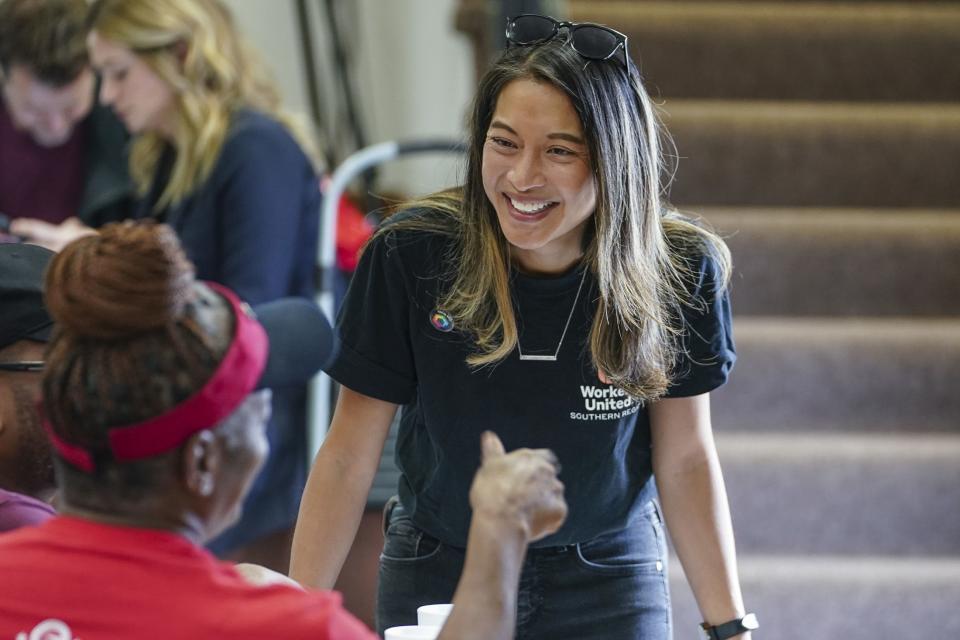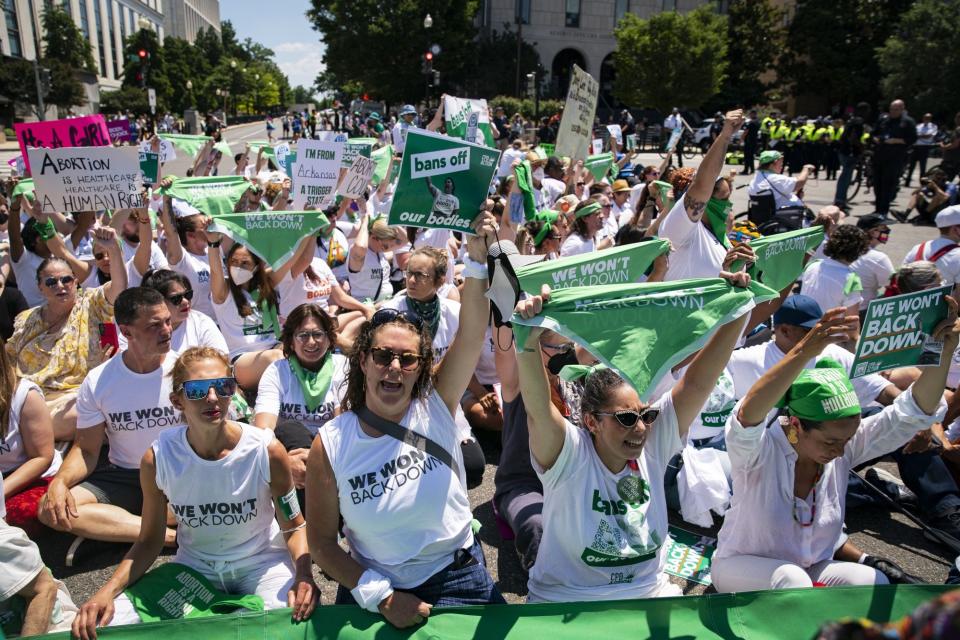Democrats Go All In on Social Issues in Sprint to Midterms
(Bloomberg) -- Democratic candidates who might earlier have recoiled from talking about social issues on the campaign trail are seeing good reason to abandon their caution in the final sprint to the November midterm elections.
Most Read from Bloomberg
Double Rainbow Appears Over Buckingham Palace as Crowd Gathers to Mourn Queen
Queen Elizabeth II, Britain’s Longest-Reigning Monarch, Dies at 96
The backlash to the Supreme Court’s decision to overturn abortion rights, an outcry over mass shootings and unease with state bills that target LGBTQ Americans are signaling to the party that, at least for now, it has the upper hand in those cultural debates — a beneficial position as it tries to limit Republican gains in the US House and Senate.
New Hampshire Democratic Representative Ann Kuster, whose districts includes commutable communities north of Boston, said the political dynamics at home have changed this summer.
“People are feeling very unsettled and unnerved about protecting their family and making their own private decisions,” she said.
That Democrats would be loudly trumpeting their social agendas in this campaign season seemed unlikely mere months ago, when many were intent on duking it out with their GOP rivals mostly over pocketbook issues, given the backdrop of soaring inflation. Gasoline prices have retreated recently and while the burden of high costs remains a top voter concern and stump speech topic, many Democrats have concluded their messaging has to make room for both economic and social issues.
Representative Mikie Sherrill, who hails from a swing district in northern New Jersey, said she’s balancing concerns from her constituents about women’s reproductive rights with stories from voters who scrapped summer trips to the beach or halted red meat purchases amid inflation’s squeeze.
In Georgia, Brenda Lopez Romero, the Democratic chair for Gwinnett County, said it’s important to address social issues, and how those policies affect individuals, to turn out the large minority population in the county, which is northeast of Atlanta.
That’s because state lawmakers have taken actions that put these matters in a brighter spotlight for voters. In April, Georgia Governor Brian Kemp, a Republican, signed a bill into law that limits how race and other “divisive concepts” are discussed in schools. The bill also gave the Georgia High School Association the pathway to place a ban on transgender high school students’ participation in sports. A 2019 law signed by Kemp to ban abortions after a fetal heartbeat is detected took effect in July.
“It is kind of scary being a woman and seeing how the state of the world is progressing or regressing,” said Nicolle, 22, a resident of Cobb County who requested to use only her first name. “And I’ve had friends who are being greatly affected by what’s going on.”
Romero sees addressing those types of voter concerns as “pivotal,” potentially helping Democratic gubernatorial candidate Stacey Abrams prevail against Kemp.
“Even if we can’t reach the majority in the statehouse right now, it means that at least we have veto power over this bad legislation,” Romero said.
Another Georgia candidate, Bee Nguyen, won the Democratic nomination for secretary of state, an office that oversees elections and business licensing and filings. Nguyen, currently serving as a state representative, has stood against Republicans on their voter-access policies that target voters of color, but she has also sought to frame abortion as a business issue.
“When we are talking to Georgia voters, we have to remind them that economics and human rights are intertwined,” Nguyen said.
As recently as June, Jacquelyn Bettadapur, the Democratic chair for Georgia’s Cobb County, was unsure what impact overturning Roe v. Wade would have on motivating voters, saying, “People are asking, ‘Do you think this abortion rights ruling is going to really drive turnout?’ I don't know. Let's see. There's a general malaise out there."
But by September, Bettadapur said, “I think it's an issue that's going to help drive out the vote,” underscoring how quickly priorities of the electorate in Georgia and elsewhere have shifted — and forced candidates to adapt.
Still, she sounded a note of caution, noting that cultural messaging should not crowd out “kitchen table issues," which she believes will be essential to winning in Cobb, which was once a Republican stronghold but has recently trended blue.
A drumbeat of recent polls offer a rationale for Democrats’ social emphasis. A Wall Street Journal survey conducted in late August found support for making abortion legal in all or most cases increased from 55% in March to 60% after Roe v. Wade was overturned. What's potentially more important ahead of the elections, 83% of Democrats said they were more likely to vote in the aftermath of the decision.
There are other signals, too: Democrat Pat Ryan won an upstate New York congressional seat in an August special election, beating his opponent in the swing district with a campaign that focused heavily on abortion rights. In Alaska, pro-choice Democrat Mary Peltola recently prevailed in a special election, flipping a House seat that had been held by a Republican.
Last month, voters in deep-red Kansas rejected a ballot measure that would have stripped abortion rights from the state constitution. That same day, Michigan State Senator Mallory McMorrow won the Democratic primary for her redistricted suburban Detroit seat in a landslide.
McMorrow, whose position was previously held by a Republican, vaulted to fame in April when she made a speech that served as a counterattack on a Republican colleague who had accused her of wanting to “groom and sexualize kindergarteners” after McMorrow opposed banning discussions of sexual orientation in schools.
McMorrow’s remarks ricocheted around the internet in part because of the way she managed to thread a political needle, describing herself as a “straight, white, Christian, married suburban mom,” while offering an unapologetic defense of progressive social stances.
At the time, McMorrow was something of an outlier among Democrats fearful of turning off their more conservative voters. Now, she might provide a template for her colleagues’ approach to keeping their jobs.
“I am, kind of, the battleground,” McMorrow, who lives in a town where 88% of the population is White and the median income is well above the national average, said in a recent interview. “So the idea that this is just something that more progressive Democrats can do, I think is wrong.”
Most Read from Bloomberg Businessweek
What a Rocket Startup That Helped Create the ‘New Space’ Wave Leaves Behind
How a Sparkling Water Company Built a Brand on Bruised Fruit
©2022 Bloomberg L.P.





